Nana – Deeply Touching Documentary about A Nana Who Survived the Holocaust
Saturday, November 4th, 2017 Nana, Reviewed by Terry Solowey
Nana, Reviewed by Terry Solowey
I have seen many films and documentaries about the Holocaust. However, as a first generation American Jew, this film touched me deeply and left an impact on me like no other. The story is narrated and directed by Serena Dykman, granddaughter of Maryla Michalowski-Dynamant who is her nana.
Two years ago, a NYU film student, Serena, 22 years old, was in her hometown of Brussels, Belgium at the time of the bombing of the Jewish Museum prior to the Charlie Hebdo terrorist attacks in Paris. She had been traveling with her grandmother’s memoirs for a while and couldn’t bring herself to read them. The attacks were the impetus to read her nana’s memoirs and make this incredible documentary about the life of her grandmother growing up in Poland, the onset of WWII, her plight in Auschwitz and post-war.
Nana, a survivor and Polish Jew, dedicated her life to talk about her experiences. As a fighter and activist against intolerance, and the importance of liberty and democracy, she tirelessly spoke to students at schools, to journalists and to government officials. She led many groups to Auschwitz to show them her living quarters and fiercely told them about what she endured. Her strength, courage and tenacity impressed me deeply. In talking about such adversity, her sense of humor, “How do you like my apartment?” stopped my tears with a light moment of laughter. Her mission: to never forget.
There are so many touching moments in this film that make a powerful impression. In one interview, she passionately talks about “the magnificent gift of fifty years of life” that she was given after the Holocaust, compelling her to talk for those who didn’t make it, exclaiming, “I had to speak out” to those who denied the Holocaust. “I had to let young people know what can happen if we support regimes like Hitler’s and others.”
In one of her talks, she was asked by a group of young people why Hitler chose to exterminate Jews and she replied, “Hitler didn’t confide in me.” The audience explodes with laughter as her wry sense of humor cuts the tension. In another scene, she talks about the need to look at the history of anti-Semitism and why it happened. She believes Hitler was manic depressive and mentally ill. “Why did the Germans who were not mentally ill vote for him? This is where we have to look for the why.”
This inspirational film is a must see. A story within a story, there are so many authentic personal stories including her memoir writer collaborator, recorder of survivor testimonies, Jewish history teacher and educational project designer among those who knew her well. Ms. Dykman’s footage is complemented by the archival footage that turned up unexpectedly.
In witnessing the three generations of women, nana left her daughter Alice and her granddaughter Serena a legacy to carry on. They do it with a strength and courage in the spirit of their nana. In today’s world, with the rise of anti-Semitism and racism, it is more relevant than ever.
I give this film 5 out of 5 stars and highly recommend it to 10 to 18 year olds as well as adults. It is in French with English subtitles. You can see NANA at film festivals across the United States. For more information, visit www:nanafilm.com.
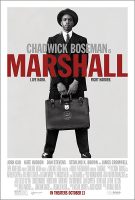 Young Thurgood Marshall faces one of his greatest challenges while working as a lawyer for the NAACP. Marshall travels to conservative Connecticut when wealthy socialite Eleanor Strubing accuses black chauffeur Joseph Spell of sexual assault and attempted murder. He soon teams up with Sam Friedman, a local Jewish lawyer who’s never handled a criminal case. Together, the two men build a defense while contending with racist and anti-Semitic views from those who deem Spell to be guilty. KIDS FIRST! Reviewer Juanita L. comments, “For me, this film brought back my experience as a young person who lived in Virginia and experienced the separate but equal in my education.” See her full review below.
Young Thurgood Marshall faces one of his greatest challenges while working as a lawyer for the NAACP. Marshall travels to conservative Connecticut when wealthy socialite Eleanor Strubing accuses black chauffeur Joseph Spell of sexual assault and attempted murder. He soon teams up with Sam Friedman, a local Jewish lawyer who’s never handled a criminal case. Together, the two men build a defense while contending with racist and anti-Semitic views from those who deem Spell to be guilty. KIDS FIRST! Reviewer Juanita L. comments, “For me, this film brought back my experience as a young person who lived in Virginia and experienced the separate but equal in my education.” See her full review below.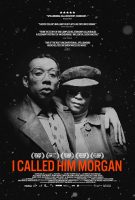 An exploration of the relationship between jazz trumpeter Lee Morgan and his common-law wife Helen, who was implicated in his murder in 1972. KIDS FIRST! Juror, Terry S. comments, “This haunting documentary about the life of a great jazz trumpeter Lee Morgan and his wife Helen is one I will not soon forget. ” See her full review below.
An exploration of the relationship between jazz trumpeter Lee Morgan and his common-law wife Helen, who was implicated in his murder in 1972. KIDS FIRST! Juror, Terry S. comments, “This haunting documentary about the life of a great jazz trumpeter Lee Morgan and his wife Helen is one I will not soon forget. ” See her full review below.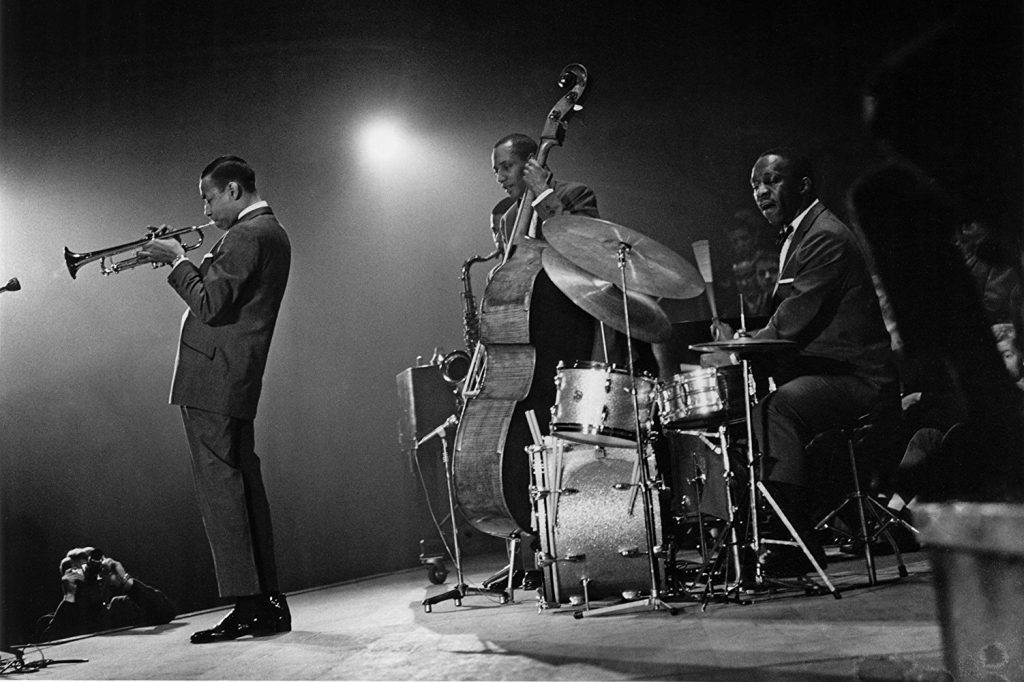
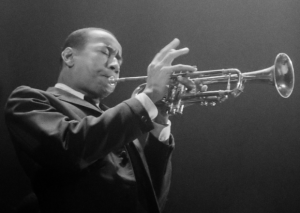 Lee had years of success playing not only clubs in the East but also on the West Coast. Some of my favorite parts of the documentary include footage on a TV show called “Soul”, where he dedicates a piece to the activist Angela Davis entitled “Angela”, and another TV show hosted by Steve Allen, a talk show host popular at the time. The other favorite part was with the jazz mobile workshop where he worked with young people on musical arrangements and gave them a chance to play and learn from him.
Lee had years of success playing not only clubs in the East but also on the West Coast. Some of my favorite parts of the documentary include footage on a TV show called “Soul”, where he dedicates a piece to the activist Angela Davis entitled “Angela”, and another TV show hosted by Steve Allen, a talk show host popular at the time. The other favorite part was with the jazz mobile workshop where he worked with young people on musical arrangements and gave them a chance to play and learn from him. 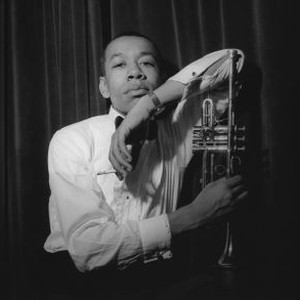
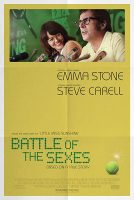 In the wake of the sexual revolution and the rise of the women’s movement, the 1973 tennis match between women’s world champion
In the wake of the sexual revolution and the rise of the women’s movement, the 1973 tennis match between women’s world champion  I enjoyed watching the drama/biography Rebel in the Rye, directed by Danny Small which examines the life of J.D. Salinger, best known for his novel, Catcher in the Rye. This book was very controversial when it first came out and, although I didn’t read it at the time, this film has inspired me to do so. More on that is yet to come!
I enjoyed watching the drama/biography Rebel in the Rye, directed by Danny Small which examines the life of J.D. Salinger, best known for his novel, Catcher in the Rye. This book was very controversial when it first came out and, although I didn’t read it at the time, this film has inspired me to do so. More on that is yet to come! Babies, Puppies, Children, Humor, and Villains all have one thing in common – they all make a terrific film! The animation is colorful and has lots of details. The storyline is cute, silly, original and fun for the whole family.
Babies, Puppies, Children, Humor, and Villains all have one thing in common – they all make a terrific film! The animation is colorful and has lots of details. The storyline is cute, silly, original and fun for the whole family. John James Audubon was one of the most remarkable men of early America. A contemporary of Lewis & Clark and Davey Crockett, he explored the American frontier in search of “the feathered tribes” he loved and studied. A self-taught artist and ornithologist, he left a legacy of art and science that made him famous in his lifetime and endures to this day. His portrait hangs in the White House, his statue stands over the entrance to the American Museum of Natural History, and his name was adopted by the nation’s first conservation organization. The program, filmed in locations where Audubon painted, brings to life his timeless paintings with dazzling footage of the living birds he immortalized and celebrates visually the natural world he described in his writings. Interviews reveal the man, explore his art and put his groundbreaking work in modern perspective. KIDS FIRST! Juror, Eli B. comments, “Audubon is such a great film about the life and contributions of John James Audubon. His struggle and journey as a Haitian immigrant to the United States of America is inspiring. The paintings he created forever immortalized the subjects (some of which are now extinct) and the research he did ultimately led to our nation’s first conservation organization.” See her full review below.
John James Audubon was one of the most remarkable men of early America. A contemporary of Lewis & Clark and Davey Crockett, he explored the American frontier in search of “the feathered tribes” he loved and studied. A self-taught artist and ornithologist, he left a legacy of art and science that made him famous in his lifetime and endures to this day. His portrait hangs in the White House, his statue stands over the entrance to the American Museum of Natural History, and his name was adopted by the nation’s first conservation organization. The program, filmed in locations where Audubon painted, brings to life his timeless paintings with dazzling footage of the living birds he immortalized and celebrates visually the natural world he described in his writings. Interviews reveal the man, explore his art and put his groundbreaking work in modern perspective. KIDS FIRST! Juror, Eli B. comments, “Audubon is such a great film about the life and contributions of John James Audubon. His struggle and journey as a Haitian immigrant to the United States of America is inspiring. The paintings he created forever immortalized the subjects (some of which are now extinct) and the research he did ultimately led to our nation’s first conservation organization.” See her full review below. examples of his beautiful works of art, maps charting his journey from Haiti to America and excerpts from the journals he kept throughout his life. This DVD offers a great way to teach anyone about John James Audubon. The art and story telling is not only beautiful and interesting, but important scientifically and in regards to American history.
examples of his beautiful works of art, maps charting his journey from Haiti to America and excerpts from the journals he kept throughout his life. This DVD offers a great way to teach anyone about John James Audubon. The art and story telling is not only beautiful and interesting, but important scientifically and in regards to American history.

 Sometimes things are not always what they seem, especially in the small suburban town where the Carpenter family lives. Single suburban mother Susan Carpenter works as a waitress at a diner, alongside feisty family friend Sheila. Her younger son Peter is a playful 8-year-old. Taking care of everyone and everything in his own unique way is Susan’s older son Henry, age 11. Protector to his adoring younger brother and tireless supporter of his often self-doubting mother – and, through investments, of the family as a whole – Henry blazes through the days like a comet. Susan discovers that the family next door, which includes Henry’s kind classmate Christina, has a dangerous secret – and that Henry has devised a surprising plan to help.
Sometimes things are not always what they seem, especially in the small suburban town where the Carpenter family lives. Single suburban mother Susan Carpenter works as a waitress at a diner, alongside feisty family friend Sheila. Her younger son Peter is a playful 8-year-old. Taking care of everyone and everything in his own unique way is Susan’s older son Henry, age 11. Protector to his adoring younger brother and tireless supporter of his often self-doubting mother – and, through investments, of the family as a whole – Henry blazes through the days like a comet. Susan discovers that the family next door, which includes Henry’s kind classmate Christina, has a dangerous secret – and that Henry has devised a surprising plan to help. As his brainstormed rescue plan for Christina takes shape in thrilling ways, Susan finds herself at the center of it. KIDS FIRST! Film Critic Willie J. comments, “However, I was pleasantly surprised by this under-the-radar film and am sure general audiences will as well. The Book of Henry is an emotionally affecting film with a few fine messages about parenthood and altruism.” See his full review below.
As his brainstormed rescue plan for Christina takes shape in thrilling ways, Susan finds herself at the center of it. KIDS FIRST! Film Critic Willie J. comments, “However, I was pleasantly surprised by this under-the-radar film and am sure general audiences will as well. The Book of Henry is an emotionally affecting film with a few fine messages about parenthood and altruism.” See his full review below. interesting premise. However, I was pleasantly surprised by this under-the-radar film and am sure general audiences will as well. The Book of Henry is an emotionally affecting film with a few fine messages about parenthood and altruism.
interesting premise. However, I was pleasantly surprised by this under-the-radar film and am sure general audiences will as well. The Book of Henry is an emotionally affecting film with a few fine messages about parenthood and altruism.
 palpable. It’s reminiscent of the concert scene in The Man Who Knew Too Much. It all comes to a satisfying ending that we all knew was coming and yet, isn’t any less smile inducing.
palpable. It’s reminiscent of the concert scene in The Man Who Knew Too Much. It all comes to a satisfying ending that we all knew was coming and yet, isn’t any less smile inducing.

 is a star athlete. Playing football like a professional, Layfield receives multiple college scholarships and is ready to begin a new chapter in his life. But, he has a big secret: he is battling a mental illness. Over a two year period, Layfield tries to keep his illness to himself and transforms from a fantastic football player to a prophet who believes he can save the world.
is a star athlete. Playing football like a professional, Layfield receives multiple college scholarships and is ready to begin a new chapter in his life. But, he has a big secret: he is battling a mental illness. Over a two year period, Layfield tries to keep his illness to himself and transforms from a fantastic football player to a prophet who believes he can save the world.  more intriguing. Steve Ellis’ portrayal of Zinte, Holden’s best friend, is humorous. Zinte truly cares about Holden and it is evident through their five year friendship. Ellis characterizes Zinte as comical, joking around with him to cheer him up. But, he is unaware of Holden’s issue. These lead actors left me on the edge of my seat for the entire film.
more intriguing. Steve Ellis’ portrayal of Zinte, Holden’s best friend, is humorous. Zinte truly cares about Holden and it is evident through their five year friendship. Ellis characterizes Zinte as comical, joking around with him to cheer him up. But, he is unaware of Holden’s issue. These lead actors left me on the edge of my seat for the entire film. situation and the camera shifts towards his point of view. For example, Holden tackles another team player on the football field before the game begins. The camera cuts to Holden’s thoughts, displaying a visual of what is going on in his brain. I enjoyed how Holden narrates his thoughts when this occurs, because I could empathize more with him.
situation and the camera shifts towards his point of view. For example, Holden tackles another team player on the football field before the game begins. The camera cuts to Holden’s thoughts, displaying a visual of what is going on in his brain. I enjoyed how Holden narrates his thoughts when this occurs, because I could empathize more with him. 
 A young Englishman plots revenge against his mysterious, beautiful cousin, believing that she murdered his guardian. But his feelings become complicated as he finds himself falling under the beguiling spell of her charms. KIDS FIRST! Juror Juanita L. comments, “The detail and beauty of the 19th century in the settings of the house and grounds captivated me. The suspense and mystery of finding out just who Rachel (Rachel Weisz) is and what will happen with Phillip (Sam Claflin) kept me on edge of my seat.” See her full review below.
A young Englishman plots revenge against his mysterious, beautiful cousin, believing that she murdered his guardian. But his feelings become complicated as he finds himself falling under the beguiling spell of her charms. KIDS FIRST! Juror Juanita L. comments, “The detail and beauty of the 19th century in the settings of the house and grounds captivated me. The suspense and mystery of finding out just who Rachel (Rachel Weisz) is and what will happen with Phillip (Sam Claflin) kept me on edge of my seat.” See her full review below. and grounds captivated me. The suspense and mystery of finding out just who Rachel (Rachel Weisz) is and what will happen with Phillip (Sam Claflin) kept me on edge of my seat. Expect candles, beds with draperies, bonnets, bumpy wagon rides and scything — as well as a modern-minded female character who may or may not be up to no good in pursuit of money.
and grounds captivated me. The suspense and mystery of finding out just who Rachel (Rachel Weisz) is and what will happen with Phillip (Sam Claflin) kept me on edge of my seat. Expect candles, beds with draperies, bonnets, bumpy wagon rides and scything — as well as a modern-minded female character who may or may not be up to no good in pursuit of money. My Cousin Rachel, adapted from a book set in the 19th Century and written in 1951 by Daphne du Maurier, is a combination of suspense, passion and some psychological glimpses of men and women in often intriguing and obsessive relationships. The story is about a rather naïve young bachelor who struggles to decide if his deceased guardian’s charming widow is the woman of his dreams or a cold-blooded killer and gold-digger seeking an inheritance. Among those disturbed by Phillip’s sudden obsession with Rachel is Louise (Holliday Grainger), his confidante since childhood who has long harbored her own unrequited crush on him.
My Cousin Rachel, adapted from a book set in the 19th Century and written in 1951 by Daphne du Maurier, is a combination of suspense, passion and some psychological glimpses of men and women in often intriguing and obsessive relationships. The story is about a rather naïve young bachelor who struggles to decide if his deceased guardian’s charming widow is the woman of his dreams or a cold-blooded killer and gold-digger seeking an inheritance. Among those disturbed by Phillip’s sudden obsession with Rachel is Louise (Holliday Grainger), his confidante since childhood who has long harbored her own unrequited crush on him.

